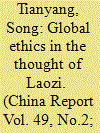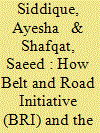| Srl | Item |
| 1 |
ID:
122641


|
|
|
|
|
| Publication |
2013.
|
| Summary/Abstract |
The thought of Laozi is of paramount importance in Chinese traditional culture. It is significant for us to discover some meaningful factors in Laozi's ideological systems in order to expand and strengthen China's soft power. Coincidently, there exists something in common between the thought of Laozi and ethics in Western political philosophy. The comparison of these ethical views of different value systems would help in better understanding the advantages of Chinese traditional culture in the process of China's soft power construction. This essay tries to summarise some common factors between the thought of Laozi and Western global ethics that can contribute to the construction of China's soft power. This could in turn offer an approach to establishing a 'Chinese school' in international political theories as well as contribute to global ethics architecture. This essay has been divided into three sections. The first discusses global ethics in Western political philosophy while the second investigates global ethics in Laozi's ideological system and then makes a contrast between Laozi's global ethics and those in Western political philosophy. In the final section, some fundamental principles in China's soft power construction will be explored.
|
|
|
|
|
|
|
|
|
|
|
|
|
|
|
|
| 2 |
ID:
177924


|
|
|
|
|
| Summary/Abstract |
A rising and globalizing China has evoked mixed reactions. There is a growing body of literature that highlights China's military hegemonic tendencies. This has overshadowed the Chinese efforts at promoting co-operative interdependence, of which the Belt and Road Initiative (BRI) is a symbol and emerging reality. This paper contextualizes the BRI, along with the China Pakistan Economic Corridor (CPEC), to examine and explore the symbols, tools and contours of the Chinese soft power. This study contends that, despite apprehensions by critics about China's motives underlying the BRI, for the participant countries it offers infrastructural development through economic investment and educational exchanges that showcase Chinese culture and its soft power. Do the participating countries find these offers appealing? This raises two critical questions: Does China's economic development oriented soft power through BRI obviates its military designs? Does China have the tools that Joseph Nye conceptualizes for the soft power that a global power requires? This study makes a critical appraisal of Joseph Nye's concept of Soft Power and analyses how the Chinese scholars and policy makers are transforming its usage and conceptual applicability as China stands for globalization, multilateralism, common and shared goals for the planet and humanity. Given COVID 19, China's soft power appeal could have political and security implications for the global world order.
|
|
|
|
|
|
|
|
|
|
|
|
|
|
|
|
| 3 |
ID:
159559


|
|
|
|
|
| Summary/Abstract |
Despite the amount of research indicating the growing success of China's "soft power" in the developing world, few theoretically informed discussions explain its soft power influence. Using Robert Cox's critical theory of international relations, this article contends that China has co-opted the future elites of the peripheral world to decrease the "China threat" argument. Through a survey of China Scholarship Council (CSC) recipients from 2009 to 2015, the authors' findings show that the CSC has played a considerable role in the socialisation of its soft power to reduce less developed countries' fear of a revisionary China.
|
|
|
|
|
|
|
|
|
|
|
|
|
|
|
|